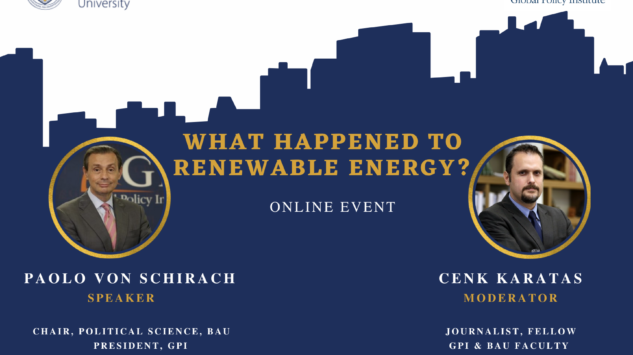On Friday, December 10, 2021, at 12:00 noon (EST), The Global Policy Institute and Bay Atlantic University held an event via Zoom titled: “What Happened to Renewable Energy?”
There is a disconnect between the very ambitious emissions reduction goals discussed at the recent COP 26 meeting held in Glasgow and what seems to be realistically achievable based on the current state of development of non-carbon-based energy technologies.
Our hopes for stabilized global temperatures and a green future rest primarily with a quick and massive global adoption of solar and wind, while retiring fossil fuels-based energy generation plants, along with carbon-based transportation fuels, such as gasoline and diesel. This is the plan. But is it doable? Are currently available green energy technologies cost-effective? Assuming they are, how long will it take to deploy them globally? Furthermore, if green energy cannot do the emissions-cutting job within the very tight time limits envisaged in Glasgow, is there a workable “Plan B”? Finally, are rising temperatures a big problem we must face, or a planetary catastrophe?
Please join us for a timely conversation to discuss these critically important issues.
Event Summary
The conversation began by addressing global warming and climate change, as they are the main reasons behind the efforts to rapidly deploy renewable energy alternatives to fossil fuel-based technologies. Indeed, we want emissions-free renewables as green replacements of fossil fuels because burning coal, natural gas and oil cause the release into the atmosphere of greenhouse gases. These emissions trap the sun’s heat, this way causing the slow but steady temperature rise.
The problem is that solar and wind, while they have become better and cheaper over the years, are still not cost-effective. They are adopted largely because of legal and regulatory mandates and tax subsidies. Still, even with these direct and indirect incentives, the amount of renewable, green energy solutions that can be realistically deployed across the world will not slow down the dreaded global warming phenomenon in any significant way.
Therefore, we have a high cost, low effectiveness approach that does not solve our rising temperatures problem. There is a better way to deal with this issue. First of all, we should direct much more funding to robust R&D efforts in new green energy technologies in order to vastly improve their cost-effectiveness. At the same time, we should invest heavily in global warming mitigation and adaptation technologies. Rising temperatures and their impact represent serious challenges. Still, there are possible countermeasures, ranging from improved coastal defenses to protect human settlements from rising sea levels to modified seeds that can create drought resisting crops, and more.
In conclusion, renewable energy technologies are here to stay. They have been significantly improved over the years. But much more needs to be done before they will be widely and voluntarily adopted on the basis of their proven ability to deliver better value at a lower cost compared with fossil fuels based technologies. Heavy investments in these green sectors will probably yield results in the future. In the meantime, let’s deal with the global warming challenge via adaptation and mitigation.
Speaker
Paolo von Schirach, President Global Policy Institute and Chair, Political Science and International relations, Bay Atlantic University
Paolo von Schirach’s research and teaching focus on international security, world affairs, international economics, competition policies, and industrial innovation. Von Schirach is the Editor of the
Schirach Report, an online publication focusing on politics, economics and international security. He is a commentator for radio and TV on US foreign and domestic politics. He holds BA and MA degrees in Political Science from the University of Pisa, (Italy), and an MA in Government (International Relations) from Georgetown University where he was also a Fulbright Scholar and a Fellow in the Government Department. He was a Research Associate at the Center for Strategic and International Studies, CSIS. Later on, he served as Director of Communications and as Senior Research Fellow at the Atlantic Council. He worked as Deputy Director of the Global Security Project at Georgetown University where he also taught in the Graduate Program of the School of Foreign Service, (MSFS). He has been a frequent lecturer at the Foreign Service Institute, (FSI), a higher education institution part of the US Department of State. An experienced trade and investment promotion expert, for over 25 years Paolo von Schirach was Team Leader and Chief of Party in South East Asia and sub-Saharan Africa for consultancies which designed, executed and evaluated private sector development strategies and projects on behalf of the United Nations Development Programme, (UNDP); The World Bank; The African Development Bank, (AfDB); The United States Agency for International Development, (USAID); The European Union Commission; Business Climate, (BizClim, Brussels); the Government of Finland; and the German Technical Cooperation Agency, (GTZ).
Moderator
Professor Cenk Karatas, Bay Atlantic University, Journalist, and Fellow at the Global Policy Institute
Cenk Karatas is an adjunct professor of Communication and Politics at Bay Atlantic University. He is a journalist and a senior analyst on Turkish affairs with a background in Turkish and international media. He holds an MA on International Relations and a BA on Advertising with an emphasis on Journalism and Media from Bahcesehir University in Istanbul.
